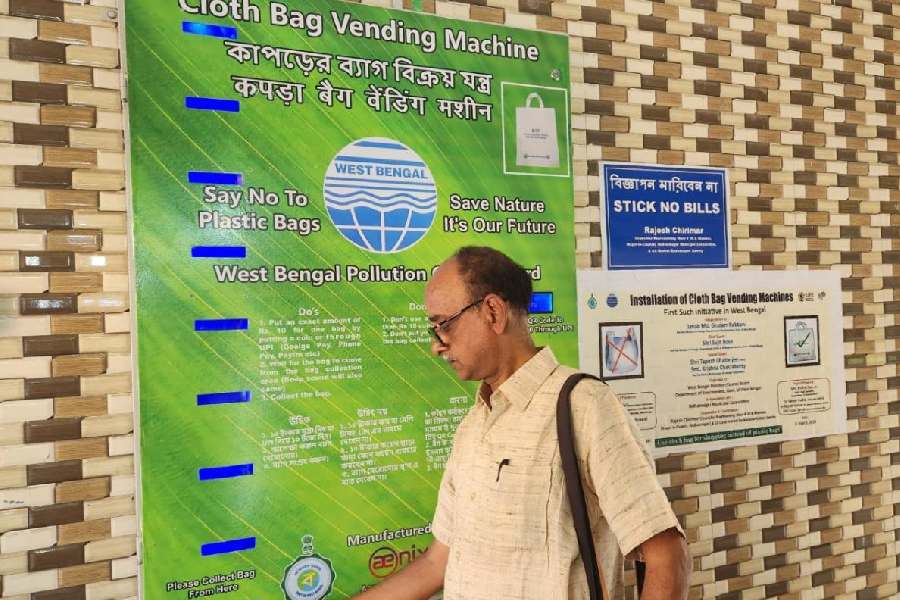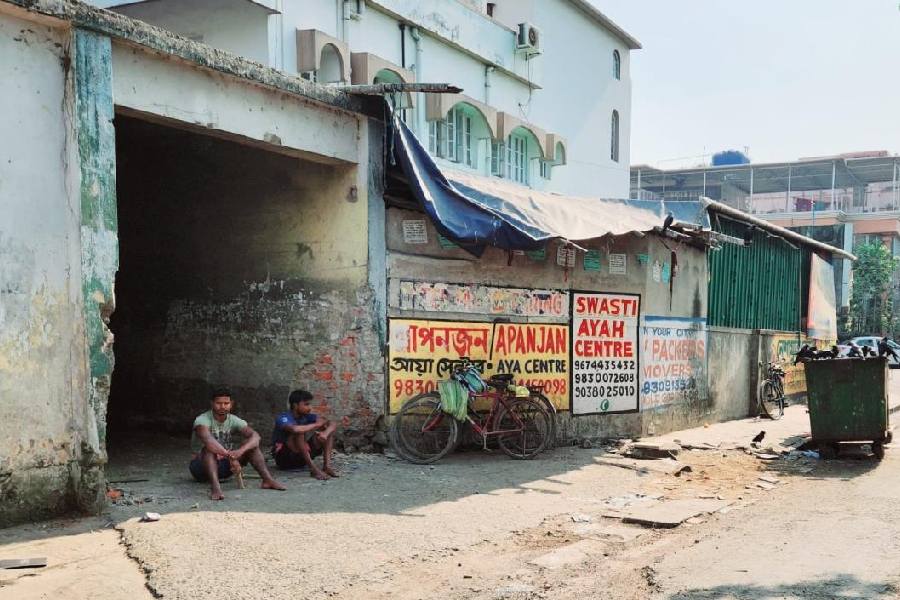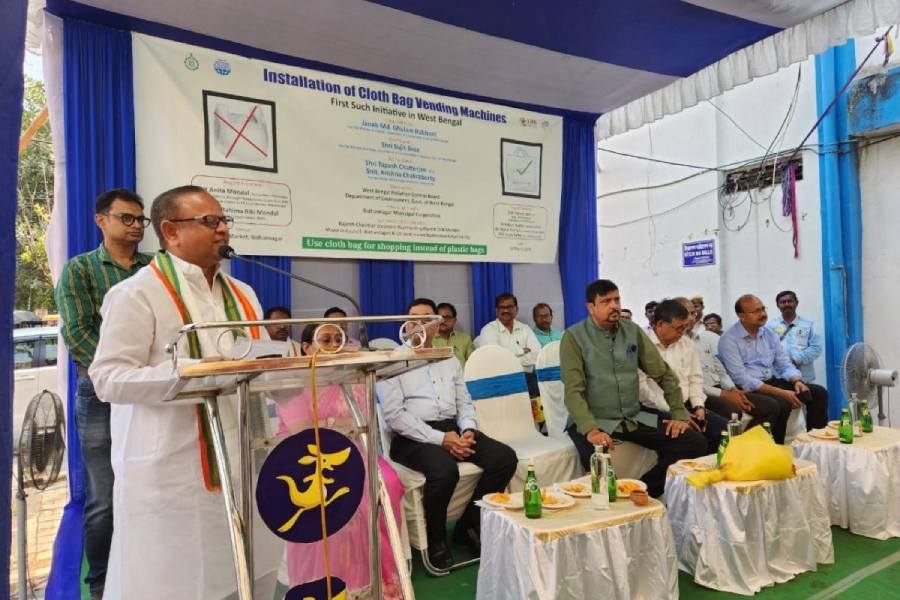CA Market has become the first in the state to get cloth bag vending machines. Two such machines, along with two other innovations, were inaugurated by minister-in-charge of the environment department, Md. Ghulam Rabbani on March 11.
The machines were provided by the state pollution control board (PCB) in association with the state environment department and Bidhannagar Municipal Corporation.
“Plastic is harmful but the government cannot put a blanket ban on it without providing alternatives. Cloth bags are eco-friendly, long-lasting, and ultimately contribute to keeping you healthy,” said Rabbani. “Salt Lake is an educated area where awareness is high and so we expect good response from citizens.”
Minister and MLA Sujit Bose recalled his childhood, when it was his duty to do the shopping at home. “My mother would send me off with separate bags for vegetables and fish but now in my own house, I see everyone going out empty-handed. They say the shops will give bags,” he said. “In such a state, these cloth bags — that you will get a subsidised rate of Rs 10 — is a practical move.”

A customer pulls out a bag from the vending machine.
Chairman of the state Pollution Control Board (PCB) Kalyan Rudra said he lived in Dum Dum Park and so wanted Bidhannagar to be a model constituency with such innovations. Rajesh Kumar, member secretary, WBPCB, praised Chirimar for his zeal in adopting and implementing new schemes of the board. “This is why we think of his area whenever launching something new,” he said. “The market’s vendors and shoppers should be proud as this is a first-of-its-kind initiative.”
Rajesh Chirimar, local councilor and mayor-in-council member in charge of markets, said shoppers should have no problem paying for the bags as they are used to paying for plastic bags at malls. “Plus, these are reuseable,” he said, adding that the flex used as a backdrop on stage at the event was made — not of plastic but — canvas. “I shall use canvas or cloth for all election-related material that we put up this season too.”
How it works
The machine is flat and wall-mounted, about four feet high and five inches deep, and with a handle on top, making it look like a bag. The two machines have been placed at the two entrances to the mart. Insert a Rs 10 coin or pay through mobile wallet by scanning a QR code that flashes on the display screen, and out comes a bag. The device works on electricity but has a battery backup in case of power cuts.
“Up to 200 bags can be folded and stored inside the machine. In fact, the remaining number of bags gets displayed on a screen. When stock is low, a message will be sent out to administrators asking for a refill and if, by chance, stocks exhaust completely, the machine will shut down,” said Pratik Churiwal, on behalf of Aeonix Research & Innovations, that has made the machines. He is also attached to Nova Innovation, that is making the bags.

An enclosure opposite CA Market that used to be a vat being prepared for the plastic waste processing unit.
“The white cloth bags measure 14”x16” and can carry load of 5 to 7kg. They are being supplied by Manjusha, the state handicraft development corporation,” he added.
Down with plastic
Khokan Chandra De said he shops on his way home after office and that he can never remember to carry a bag in the morning rush. “A machine like this would solve my problem,” said the resident of Birati who is now counting the days till the machine is installed there. “I don’t have anything particular to buy today but have got a bag to try the machine. I’ll now browse CA Market and pick up something to put inside it,” he said.
Mousumi Chowdhury of Ganga Dairy at the market acknowledged the idea but added that most customers bring bags anyway. “For the rest, we give cloth bags free of charge,” said the staff of the gift shop. “I expect customers to try out the machine for the novelty factor.”
Arun Roy, secretary of the market committee, said that regular drives and announcements had reduced the use of plastic to a great degree in CA Market. “Items like fish and meat may be difficult to pack in these cloth bags but will be useful for everything else,” he said.
About a week go, shopping carts were introduced at the market too and Roy said they were gradually getting utilised by customers.
Plastic waste processor
Right next to one of the vending machines in the market, is a plastic bottle crusher, another innovation that was introduced a couple of years ago. “The machine is useful but gets jammed as people also throw other kinds of plastic, like chips packets into it,” said Roy.
A solution to this is a larger model of the plastic crusher that compresses all kinds of plastic and reduces them to granules that can be recycled.
Bose has used his MLA local area development fund to buy two such machines, out of which one will be used in South Dum Dum and the other in CA Block. “The machine costs about Rs 5 lakh and I have given Rs 1,40,000 from my councilor fund for the civil work of this machine, which is being installed in what used to be a vat opposite the market,” said Chirimar.
The ward has two schools and several ceremonial houses and generates 150-200kg of plastic a day. “We shall crush this waste, convert it to granules, and hand it over to licensed recyclers who are using it to make things like paver blocks these days. Initially, we shall compress it all together and later try to segregate the plastics as per quality, such as shampoo bottles and milk pouches, as it is easier for recyclers that way. The unit should be ready in a few days.”
New Town model
Next door, New Town has used recycled plastic to make two streets, one near City Centre 2 and the second the Smart Street stretch next to Biswa Bangla gate.
“For this, we shredded waste plastic and used five per cent plastic and 95 per cent bitumen for the streets,” said Debashis Sen, the recently retired chairman of New Town Kolkata Development Authority. “Water is the biggest enemy of roads but plastic resists water and so these streets have needed no maintenance since they were made four years ago.”
While CA Block will be getting its own plastic crusher, the New Town authorities had got road contractors to crush it for them. “New Town segregates its plastic and sells it to recyclers,” Sen said.
He also recalled the various methods they have tried to reduce plastic in markets. “Besides cloth bag distribution drives, we had even tried to use AI-based camera feeds to detect if any customer entered the market with plastic bags. This was at CD Market but it wasn’t very successful,” he said.
Then, he said, cloth bags were not suitable for carrying wet poultry purchases. “So we introduced biodegradable plastic bags. But they cost five times as much as regular ones so we started subsiding them for shopkeepers. After some three years of trials with such initiatives, CB Market is virtually plastic-free now,” said Sen.
Rudra of the PCB acknowledged the utility of plastic but said one has to find ways around it. “When I go shopping, I use a thick plastic bag for fish. This bag is washed, dried and reused on my next trip,” he said. As for the vending machines, he later said that over 100 bags had already been dispensed in the first two days. “We want to set up more units like this, especially in malls like City Centre 1 and 2, which get high footfall.”
